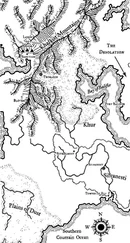“I can’t tell you that, sir.” The woman’s voice had gone from bored-but-friendly to officious-and-stern.
“That’s too bad,” I said. “Because when the Fed won’t help law enforcement recover cash that’s stolen from one of their shipments, that’s serious indeed. Just the sort of thing that my buddy, the chairman of the Committee on Oversight and Government Reform, would love to sink his claws into. You know how they love scandals like this. How do you spell your last name, again?”
If there’s one thing a bureaucrat fears more than having to work past five o’clock, it’s having to testify before Congress.
By the time I hung up, I’d confirmed my suspicions. Sure enough, the cash on that plane was part of the famous nine billion dollars that had gone missing in Baghdad a few years back.
But I still hadn’t cracked the mystery of who or what Traverse Development was, and that wasn’t going to be easy to do out of this office. Not with Jay Stoddard looking over my shoulder. And not without asking questions about it, as I promised Jay I wouldn’t do.
I had an old friend named Walter McGeorge, who was an expert in TSCM, which is the industry shorthand for Technical Surveillance Countermeasures. In simple terms, Walter was a bug-sweeper, the best I’d ever met.
Walter had been a communications sergeant on my Special Forces team. He’d been trained in all the usual stuff-radio equipment and wire communications, burst-code radio nets, and so on. Everything from encrypted satellite transmissions to old-fashioned Morse code. Somewhere along the line, “Walter” had become “Hognose,” because of his passing resemblance to Porky Pig, and then “Merlin,” as he earned the admiration of his teammates. He was recruited to the same Pentagon intel team as me but survived longer. When he finally decided he wanted out, I got him a job doing bug sweeps for a TSCM firm in Mary land. He’d done a number of projects for me since Stoddard Associates didn’t have TSCM specialists on staff: That was a specialized skill these days. All the big investigative firms outsourced those jobs now.
I reached him on his cell. The connection was crackly, and I asked whether I’d disturbed him on a job.
“Yeah,” he replied crankily. “A job involving bluefish.”
Merlin was a serious sport fisherman and kept a small boat in the Harbour Cove Marina on Chesapeake Bay.
“I need to send someone a package,” I said. Before he had the chance to make a crack about how he wasn’t my secretary, I went on: “I have the address of a drop site, and I want to send them a GPS tracking device. You think you could send out a FedEx package with one of those letter loggers inside?”
“You looking for historical data?”
“Historical?”
“If you’re talking about the GPS Letter Logger, the one that’s like a quarter inch thick and fits in a number-ten business envelope, well, that just records where it’s been after the fact. It’s not real-time. You have to get it back to download the data. And I got a feeling you’re not going to get it back.”
“I need real-time. I’m figuring the FedEx package will get delivered to the drop site and probably transferred to some actual office, where it’ll get opened.”
“Maybe. Maybe not.”
“Maybe not,” I conceded. “Still, it’s worth a try. Once they open it and see a tracker inside, they’re going to destroy it. But at least I’ll get the real location that way.”
“You think so, huh?”
“I hope so. That’s why I’m calling you.”
“Well, here’s the deal. If you want a GPS logger that can broadcast its location in real time, it’s gonna be a little beefier than that Letter Logger device. It’ll send out real-time position data as SMS text messages. Lithium-ion battery. Should stay powered for ten days.”
“Think you can pop one in the mail later on today?”
“Soon as I get back to the office.”
Another call was coming through. I recognized the number, told Merlin where to send the package, and said, “Thanks, man. Good fishing.”
Then I picked up line 2. “Lieutenant Garvin,” I said. “Thanks for getting back to me.”
“Good to hear from you, Mr. Heller,” the cop said. “Funny coincidence, actually. I’ve been wanting to talk to you about your brother.”
The headquarters of the Violent Crime Branch of the Washington Metropolitan Police was hidden away in the back of some dismal shopping center in southeast D.C., off Pennsylvania Avenue. I headed over there right after work. I was buzzed in and entered a dimly lit corridor that smelled of vomit, the stench not quite masked with some deodorizing spray that was almost as bad. I passed an open conference room that had crime-scene tape stretched across the doorway, probably to keep people from accidentally stepping into the mess on the floor.
Detective-Lieutenant Arthur Garvin met me halfway down the hall. He wasn’t quite what I expected. He had an almost professorial appearance: thick steel-rimmed glasses, scraggly white goatee, red-rimmed nostrils. On the way over, I’d called in to the office and asked Dorothy to do a quick backgrounder on the guy. He was sixty-four, with thirty-two years of service, and had gotten a retirement waiver. The police and the fire department had a mandatory retirement age of sixty, but they made exceptions in special cases. Most cops want to retire as soon as they can, I’ve found. The ones who get retirement waivers are the ones who love what they’re doing.
He wore a light blue shirt with a button-down collar, neatly creased; he had his shirts professionally laundered, and they came back in boxes. Not a polyester kind of guy. Neat and orderly, though a large dark grease stain in the middle of his shirt pocket marred the effect.
He shook my hand. His was damp. “Come on back to my office. Ordinarily, we’d talk in the conference room, but it’s undergoing maintenance.”
“Smells like someone couldn’t hold their Jack Daniel’s,” I said.
He scowled. “Nah, something’s going around the office. Some kinda stomach virus.” He sounded congested, kept sniffling.
He didn’t share an office since he was a lieutenant. His was cramped and windowless, with a bad rug and wood-veneer paneling and a lot of framed certificates and awards. It reminded me of a home office in someone’s finished basement.
Garvin sat behind his desk and took a long swig of coffee from a giant mug. “Coffee?”
“No, thanks.”
“So, snake-eater, huh?”
I shrugged. He’d checked me out, too.
“Isn’t that what they call you Green Berets?”
No one I knew in the Special Forces ever used the term “snake-eaters.” We all went through a pretty nasty training program called the Q Course, but you didn’t actually have to cook and eat snake. Maybe in the old days you did. No one ever called us “Green Berets” anymore, either. Not since John Wayne.
“Guess so,” I said.
“You’ve been with Stoddard Associates for about three years.”
“That all? Seems a lot longer.”
“Now, I assume you’re here for personal reasons and not on business.”
“Right,” I said.
He sneezed, pulled out a crumpled handkerchief, blew his nose loudly. He sneaked a surreptitious glance at the contents of his handkerchief before crumpling it back up and stuffing it into his pants. “Sorry. I shouldn’t have come in to work today, and now you’re gonna catch this damned thing.”
“I don’t get sick,” I said.
“Bad luck to say that. Now you’re really gonna get hit bad.”
“I’m not superstitious either,” I said. “Where’s your partner? Scorpino? Scardino?”
“Scarpino. Tony’s on another case. He’s been reassigned.”
Читать дальше












